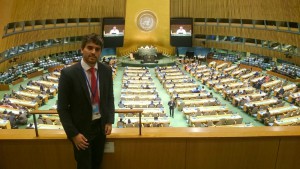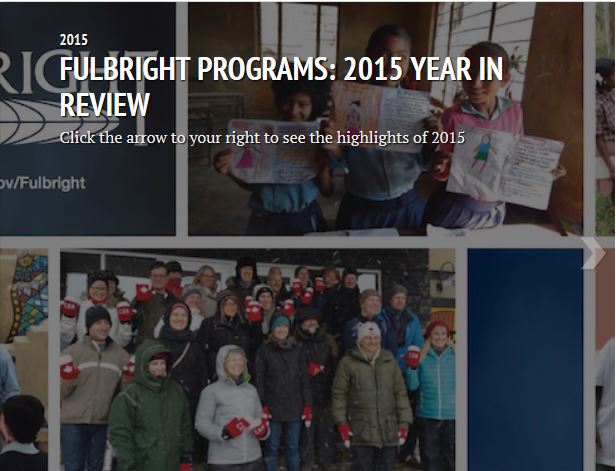
Franco Borrello, 2014-2016, Argentina, attending the 70th UN General Debate at the UN Headquarters in New York City on September 28th, 2015. During this historic event, the 2030 Agenda for Sustainable Development was adopted.
I have dedicated my career to studying energy, and it is one of the reasons why I came to Boston to pursue a Master of Science in Energy Systems at Northeastern University, thanks to the Fulbright Foreign Student Program.
This year, I have had the pleasure of participating in two high-level events at the United Nations Headquarters in New York City. In May, I attended the annual Sustainable Energy for All (SE4ALL) Forum. The SE4ALL initiative is a multi-stakeholder partnership launched by the UN in 2011 with three main objectives to be achieved by 2030: Ensuring universal access to modern energy services; doubling the global rate of improvement in energy efficiency; and doubling the share of renewable energy in the global energy mix.
During this event, I learned about success stories, innovations, and solutions deployed across the world in the energy sector. Most importantly, I interacted with colleagues and decision-makers in my field who shared valuable advice, which in turn, contributed to improving my own ideas. A very important takeaway I was left with was that establishing collaborative public-private partnerships has been very important to the energy field, especially in promoting and reducing risk in renewable energy projects designed for developing countries.

Franco Borrello, 2014-2016, Argentina, participating in a workshop at the Sustainable Energy for All Forum, in New York City on May 17th, 2015. This multi-stakeholder event brought together 1,300 global leaders from different sectors and focused on taking action on financing sustainable energy projects.
More recently, this past September, I had the honor of attending the UN Summit for Sustainable Development and the UN General Debate. I heard more than 20 world leaders speak at the General Assembly and also had an opportunity to network and share ideas with energy policymakers, businessmen, investors, and technological innovators. Addressing climate change has become a UN top priority, and a concerted effort is being made to establish mechanisms to catalyze large-scale financing towards energy projects. By attending these UN events, I established valuable connections that will allow me to work on collaborative efforts for Latin American energy markets in the future.
Of countries in the world, Argentina is one with highest potential to generate renewable energy: The winds of Patagonia, the sun of Northwest deserts, the waves and currents of the Argentine Sea, and the geothermal potential of the Andes. Recently, Argentina’s National Congress passed a law that established a goal of reaching 20% renewable energy sources for the country’s energy matrix by 2025. This initiative could lead to a new era for renewables in Argentina, even though investments of around $41 billion will be needed to reach this goal. Throughout the SE4All Forum, innovative ways to attract financing for renewable energy projects were discussed and proposed. I am excited to share the knowledge I gained at this event – and throughout my professional career well after my Fulbright grant – by helping my country to achieve its renewable energy goals.
Being a part of such relevant UN events has given me a chance to participate in a movement that aims to address current global energy challenges. These unique experiences complement the technical expertise I have gained thus far at Northeastern with new connections and innovative ideas to develop concrete solutions for Argentina’s energy industry.


No Comments